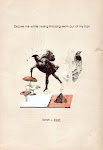Set in post-war Austria, what struck me about Jelinek’s book was the down-spiraling dynamic and the feeling no one's in control. As if there weren't even a narrator. The manic title, Wonderful Wonderful Times, with its exaggeration and sarcasm, heightens that impression. (The German title is the more sober Die Ausgesperrten, meaning 'the outsiders,' or 'the barred,' and is in part a reference to Camus' The Stranger, alluded to many times.)
Canada is controlled. The past tense helps. The narrator lets you know ahead of time what is going to happen. He is sane. He establishes his trustworthiness. He downplays and explains, or at least seeks explanation.
Jelinek does none of that. Disgust, hopelessness, delusion all tumble across the pages. And despite the lack of humanity, things still turned out worse than I expected! (Thank you, realism.) A good book to end a summer of rain, atomic sunshine and temperature swings.
I got interested in Canada after some online friends read it. Years ago I enjoyed Independence Day, but decided Ford was another white American suburban guy I didn’t need to do more of. Then about 5 years ago I read a short story of his that was so fabulous I felt like a snake that shed its skin.
I didn’t have a compelling reason to read Canada now except a colleague offered to lend me her copy. Then I noticed Ford would read in Frankfurt in October so my colleague and I got a bit excited and bought tickets and I knew I had to read it before that, and I knew I was going to the states for a week any minute now and I really didn’t want to lug the book back and forth (since it’s my colleague’s).
I gave up today on finishing before I leave. I will be lugging it. Over Canada.
* *
From a Guardian interview:
In the book, Canada becomes a sort of promised land. There is a line: "Canada was better than America and everyone knew that - except Americans." Is that how it feels to you?
"I never had much conceptual idea of Canada being better. But whenever I go there, I feel this fierce sense of American exigence just relent. America beats on you so hard the whole time. You are constantly being pummelled by other people's rights and their sense of patriotism. So the American's experience of going to Canada, or at least my experience, is that you throw all that clamour off. Which is a relief sometimes."
In the book, Canada becomes a sort of promised land. There is a line: "Canada was better than America and everyone knew that - except Americans." Is that how it feels to you?
"I never had much conceptual idea of Canada being better. But whenever I go there, I feel this fierce sense of American exigence just relent. America beats on you so hard the whole time. You are constantly being pummelled by other people's rights and their sense of patriotism. So the American's experience of going to Canada, or at least my experience, is that you throw all that clamour off. Which is a relief sometimes."




1 comment:
Fascinating blog. One of the main differences in Canada: generally Canadians will give you a listen and respond thoughfully to what you have to say, instead of pounding their own agenda down your throat. But then, we have our share of assholes, too.
Post a Comment